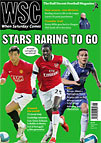 Research has proved that there is more to penalties than just luck, writes Simon Creasey
Research has proved that there is more to penalties than just luck, writes Simon Creasey
Shootouts are always fraught with tension. However, one man believes that he has discovered a way of easing the tension and maximising a team’s chances of winning. The man in question is Ignacio Palacios-Huerta from the London School of Economics’ department of management. Part of his body of work includes a recently co-authored report with Jose Apesteguia of the Universitat Pompeu Fabra, in Barcelona, entitled “Performance pressure in the workplace: evidence from a randomised natural experiment”. The report saw the pair study 260 shootouts from national and international cup competitions – a total of 2,712 penalty kicks.
The findings were extremely illuminating, according to Palacios-Huerta. “A penalty shootout is designed as, and is considered to be, a lottery, that is a 50-50 situation. But in reality it is not and I’m not sure FIFA know this. We were shocked when we found that the team that kicked first won 60.5 per cent of the time.” The reason for this is simple. Since statistically most penalties are scored, kicking first means that teams are at worst likely to be level throughout the shootout and have the chance to go ahead. The side kicking second, however, will usually lag behind in the aggregate score and have at best the opportunity to draw level.
“The main lesson is that the winner of the toss should always choose to kick first,” Palacios-Huerta says. “While of course any of the two teams can win, the team kicking first has a 21 per cent greater probability of winning the shootout. They will not always win, but if you are given the chance to choose, why would anyone choose to give their opponent this extra 21 per cent probability? Going first is even more valuable than having one extra kick, yet no one talks about it.”
Palacios-Huerta says that he was perplexed to see Rio Ferdinand in the final of the Champions League unsure of what to do having won the toss. (He eventually made the right decision and opted to kick first.) Perhaps the most surprising decision in a shootout of late was made by Italy against Spain in the Euro 2008 quarter-finals – Gianluigi Buffon won the toss and chose to kick second. In the same tournament, Croatia opted to go first against Turkey and eventually lost the shootout, but Ignacio-Huerta puts this down to the fact that Luka Modric made the crucial mistake of missing the first kick thus giving Turkey the opportunity to take the lead, and the advantage, with their first shot.
Another important finding of the research was the order in which players should step up to take their penalty. The data shows that while it is obviously important to score with every kick, the first and last penalties are usually the most important, generating a greater difference in the final outcome than the second and third kick. “This means that the best players – or those that can handle their nerves better in a shootout – should be placed first and last and not in the middle,” Palacios-Huerta concludes.
As for the best place for penalty takers to hit their kick, statistical analysis shows that while most players typically favour shooting in the direction of their stronger foot, they are just as likely to be successful on their unfavoured side. Furthermore, if you look at a long enough sequence of penalty kicks for a particular player it is typically random, meaning that there is no way of predicting where the next shot is going to go. However, the data threw up a couple of surprising exceptions. “Looking at Thierry Henry’s penalties during his years at Arsenal, I could fairly well predict where the next kick was going to go,” Palacios-Huerta says. “Similarly, among players currently in the Premier League Cristiano Ronaldo is not unpredictable. He might be the most famous, but he is not the only player who has room for improvement.” Perhaps Sir Alex might want to reconsider his choice of number-one-spot kicker – or install Palacios-Huerta as his new number two so that he can show Ronaldo where he is going wrong.
From WSC 259 September 2008